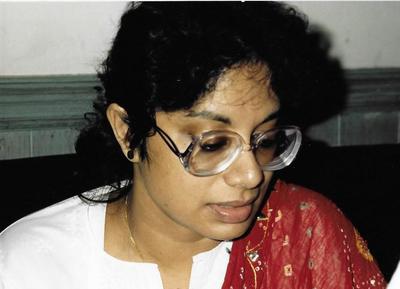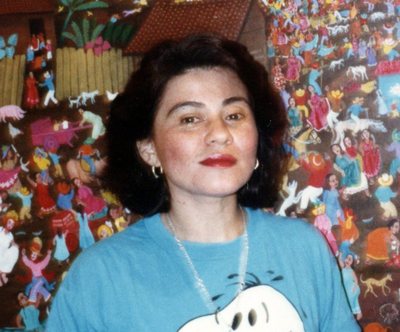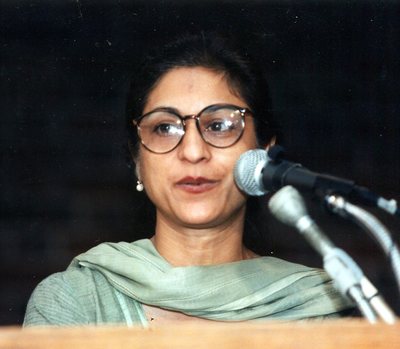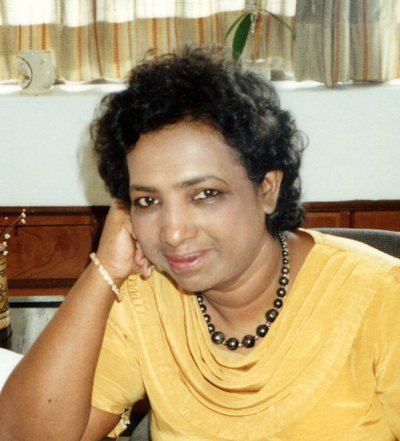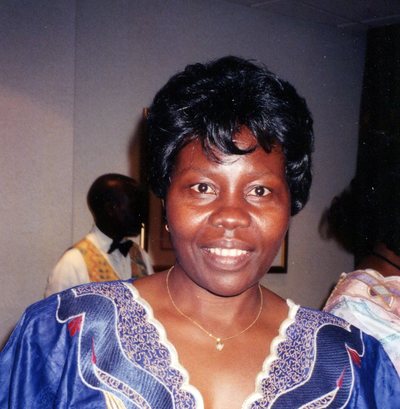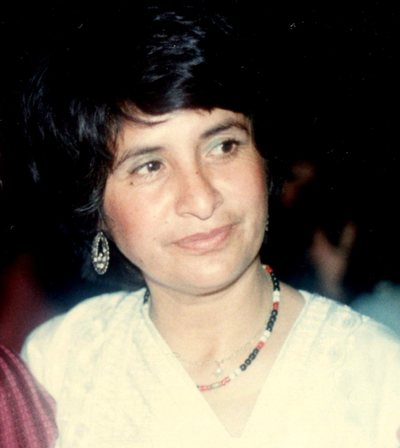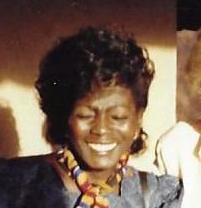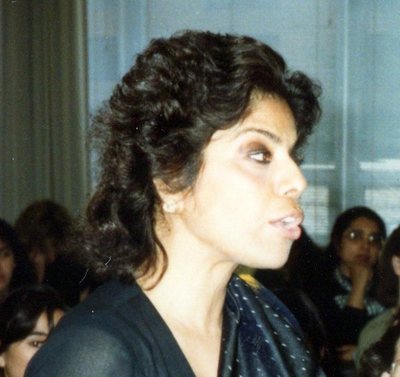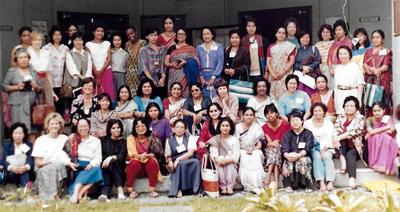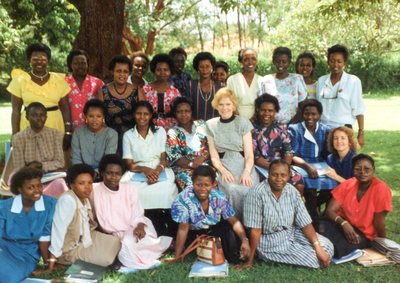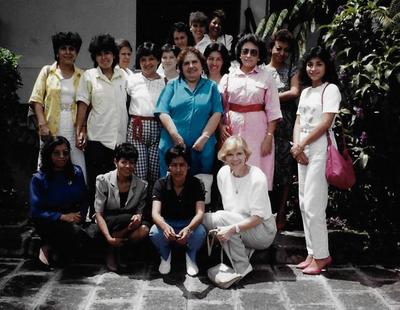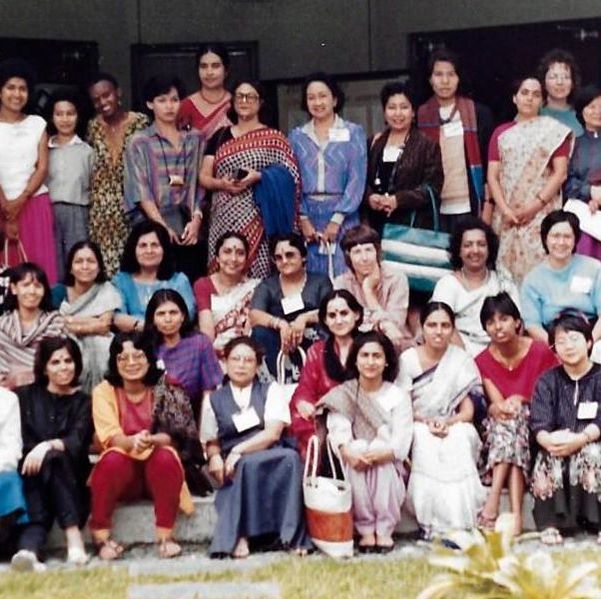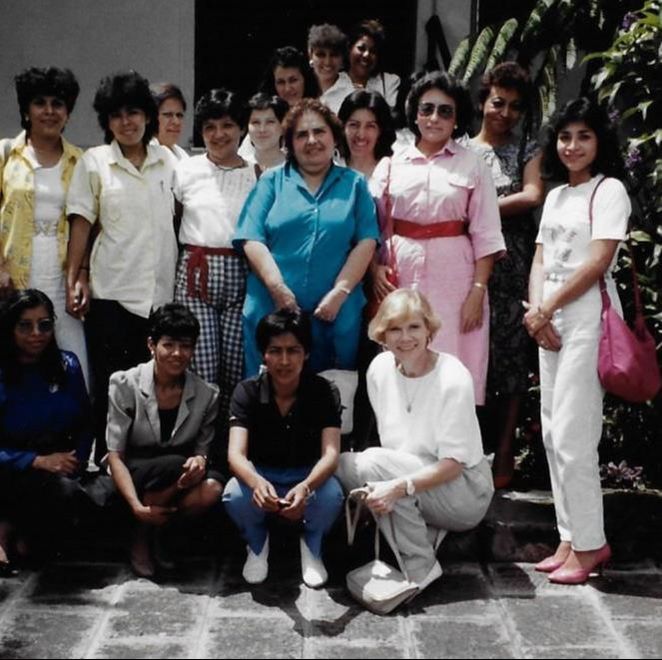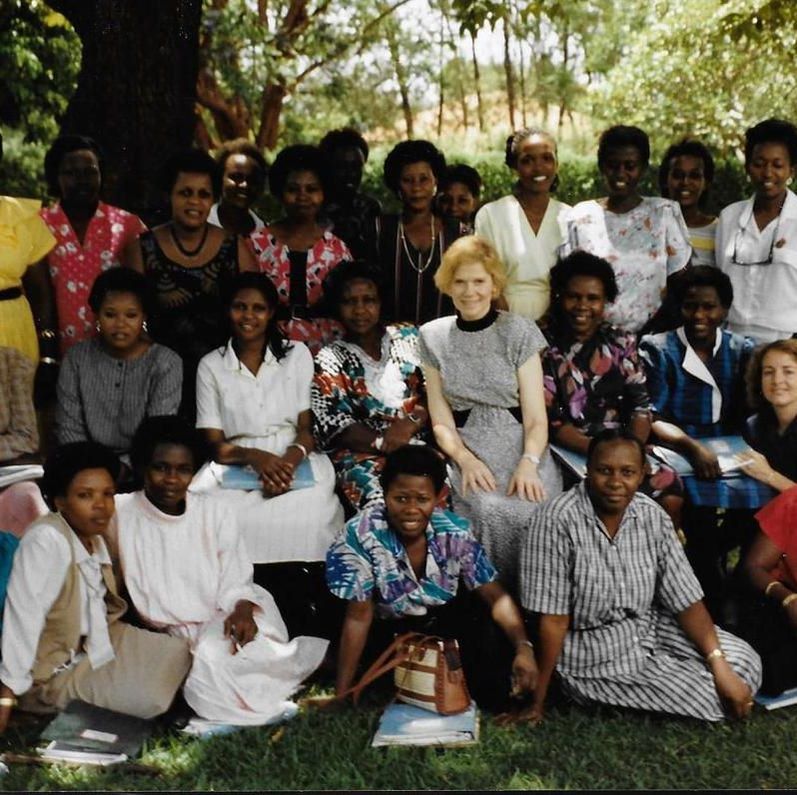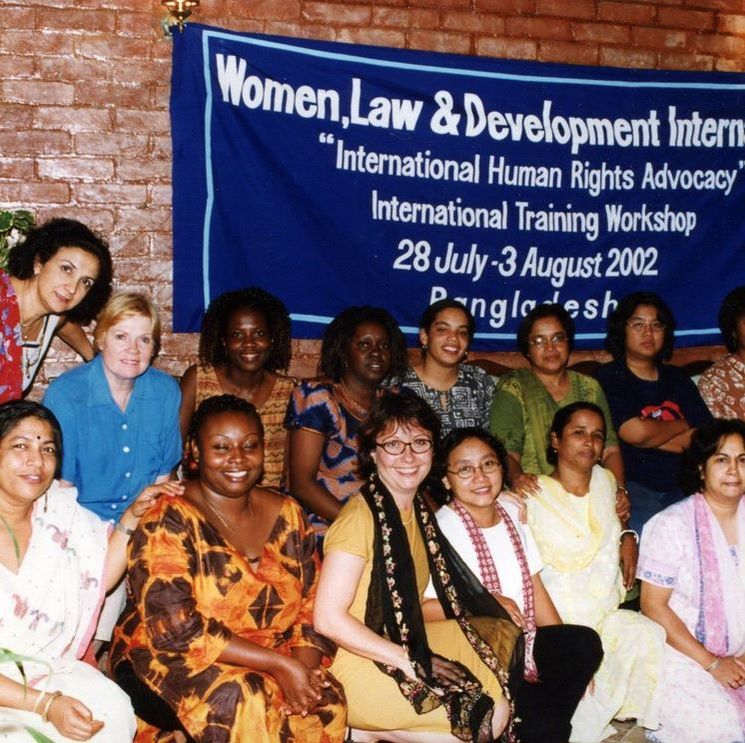
©
Margaret Schuler
Adopted and Maintained by PARTNERS FOR LAW IN DEVELOPMENT (PLD INDIA)
as part of the digital Feminist Law Archives
Adopted and Maintained by PARTNERS FOR LAW IN DEVELOPMENT (PLD INDIA)
as part of the digital Feminist Law Archives
Asia, Africa, Latin America
Following the Nairobi WLD Forum recommendations, the WLD program of OEF International focused on the formation of regional women's rights organizations in Asia, Africa and Latin America. Each region had its own process and dynamics, sources of funding, challenges and outcomes. The result of this work was the foundation of APWLD, (Asia Pacific Forum on Women, Law and Development) in 1986, CLADEM (the Latin American and Caribbean Committee for the Defense of Women's Rights) in 1987 and WILDAF (Women in Law and Development in Africa in 1990).
Early contributors to Women, Law and Development
Background
In July of 1985, hundreds of women participated in the 5-day Third World Forum on Women, Law, and Development in Nairobi, Kenya. The WLD Forum served as a mechanism for systematizing understandings about how the law—formal and customary—affects women and how strategies can improve women's legal status and have a positive impact on their participation in development. The Forum participants discovered that women throughout the Third World wage similar struggles for their rights. They clearly saw that combining efforts is a critical step toward overcoming obstacles that women face everywhere. The WLD Forum, they agreed, should mature as a vehicle for continued dialogue and collective action at the international and regional levels.
In July of 1985, hundreds of women participated in the 5-day Third World Forum on Women, Law, and Development in Nairobi, Kenya. The WLD Forum served as a mechanism for systematizing understandings about how the law—formal and customary—affects women and how strategies can improve women's legal status and have a positive impact on their participation in development. The Forum participants discovered that women throughout the Third World wage similar struggles for their rights. They clearly saw that combining efforts is a critical step toward overcoming obstacles that women face everywhere. The WLD Forum, they agreed, should mature as a vehicle for continued dialogue and collective action at the international and regional levels.
Creating an International Agenda
They recommended several proposals that eventually became the blueprint for future WLD action.
They recommended several proposals that eventually became the blueprint for future WLD action.
- The first recommendation was to implement regional conferences as a means to bring together women's organizations to exchange information, share strategies addressing women's rights issues, and develop mechanisms to coordinate research and action at the regional level.
- The second recommendation focused on the importance of consciousnessraising among women about their situation and proposed the promotion of "Know Your Legal Rights" campaigns throughout the world. To be empowering, such campaigns would demystify and popularize the law by using mass media and other strategies to make it more accessible to the women. In the process, the goal was to contribute to the development of "alternative law" (feminist law) which would maximize women's rights. It would draw from the language, reality, and experiences of the Third World peoples, whose interests historically have been ignored.
- A third recommendation was to establish an Emergency Committee of Third World Women for voicing concern about and mobilizing world opinion against any violations of the civil, legal, and human rights of women in Asia, Africa, and Latin America.
- Finally, they recommended establishing an independent, NGO advocacy body, an "International Commission on Women's Rights," as it was called. It would link the networks of women's organizations throughout Asia, Africa, and Latin America to share information about women's struggles for their rights, formulate draft legislation on specific issues concerning women at regional and international levels, conduct research in areas of special concern to women in Asia, Africa, and Latin America, and finally, represent women's rights interests and become a presence in international fora.
Organizing in Asia, Africa and Latin America
First Steps
The WLD Forum planning group met immediately after its conclusion to discuss how this emerging "WLD" dynamic should proceed. Future steps, the committee agreed, would build upon the groundwork laid by the WLD forum and its preparatory process. First of all, it would focus on developing networks of third world women involved in action-oriented programs to promote and improve the legal situation of women. These networks were viewed as vital for implementing the forum recommendations and other future WLD activities. The planning committee felt that in this way, the Third World Forum on Women, Law, and Development would be institutionalized at the international and regional levels. The establishment and consolidation of regional WLD networks would give institutional continuity to the work and interest that was stimulated by the initial Forum process and program. It would only be through the leadership, organization, and direction of the regional organizations that the goals and objectives articulated by the participants in Nairobi would be fulfilled.
Since the participants in the Nairobi WLD forum already set an international agenda in general terms, the primary follow-up tasks became those of concretizing the agenda in each region and establishing the most appropriate way to implement its components.
One of the defining features of the WLD forum process was that it was grounded in the experiences and wishes of third world women. There were no North American or European contributors to the forum other than me, who had been the chief organizer. In an evaluation of the forum, many of the participants remarked that its "south-south" character made them enthusiastic about it. The forum provided space for the interchange of ideas among third world women. They did not have to compete with first world women, who tended to dominate both the language and ideas at international fora. Having tried to listen rigorously to the participants and carry out their wishes throughout the process, it was gratifying to see what an ambitious and visionary agenda they had set for themselves. At the end of the Forum in Nairobi, I assumed that my role was finished. At a final meeting of the planning group I congratulated them and wished them well. They responded by requesting that I and OEF continue to assist them in making their vision a reality.
At this juncture, so many years later, it may be difficult to appreciate the unexpectedness of this request. There had been no plans or anticipation that the WLD/OEF would necessarily be integral to the emerging WLD agenda; all effort had gone into making the forum on Women, Law and Development happen so that third world women could exchange ideas and learn from one another about issues that were important to them. But when forum participants articulated such a powerful set of cooperative recommendations, a new reality suddenly took shape. At that point, there was neither organization nor personnel in the regions available to dedicate themselves to following up with the vision. Nor was there funding. All that existed was a minimal mechanism, consisting of me and Robin at OEF, to set this work in motion.
In the months that followed, I enthusiastically developed a comprehensive proposal to carry out the work needed to hold conferences in each of the three regions as a precursor to fulfilling the rest of the recommendations. The primary donor agency I hoped would fund this program was the Ford Foundation in New York, since they had funded much of the Nairobi Forum project. The new proposal systematically laid out activities, timelines and budgets in an elegant process that would have developed each region simultaneously, leading to a finale in which an international commission on women’s rights would be established. I sent the proposal to Ford and waited for the response.
Within a few days I received a phone call from Karen McGuinness from the international women’s unit at Ford, telling me that the foundation was not interested in supporting the initiative. Shock! The decision had come down from one of the high-level managers at Ford, who said they were not interested because the problem was its regional character. They had funded regional initiatives in the past and it hadn’t worked out as expected. I requested a meeting. It was arranged and I traveled to New York to plead my case. I argued that results would be different with women. "No comparable organization exists in any of the three regions and the clarity of their vision about what can be achieved bodes well for success." I'm not exactly sure why he changed his mind, but the foundation did agree to support the effort. However, they would only fund one regional conference to begin with, implying that if it was successful, there would be support for the other regions.
Of course, life is never that simple. As it turned out, finding support for WLD efforts required a lot of creative effort. Sometimes it meant piecing together partial funding from different sources, sometimes breaking down the process into separate fundable components, and often, piggy-backing essential activities onto other initiatives. While there was a common vision, the process simply did not happen as a systematic, comprehensive, interconnected set of actions. But it did happen and the story is compelling.
Over the next several years, then, the focus of the WLD/OEF program was the organization and consolidation of the regional networks. Once they were established, WLD/OEF continued to support them by developing collaborative action research projects to address issues of interest to them and aimed at building the capacity of network members. As a result of its regional organizing efforts, WLD evolved into an organization in its own right, autonomous and international in character. For that reason, the development of WLD International will be the fourth organization covered in this section.
The WLD Forum planning group met immediately after its conclusion to discuss how this emerging "WLD" dynamic should proceed. Future steps, the committee agreed, would build upon the groundwork laid by the WLD forum and its preparatory process. First of all, it would focus on developing networks of third world women involved in action-oriented programs to promote and improve the legal situation of women. These networks were viewed as vital for implementing the forum recommendations and other future WLD activities. The planning committee felt that in this way, the Third World Forum on Women, Law, and Development would be institutionalized at the international and regional levels. The establishment and consolidation of regional WLD networks would give institutional continuity to the work and interest that was stimulated by the initial Forum process and program. It would only be through the leadership, organization, and direction of the regional organizations that the goals and objectives articulated by the participants in Nairobi would be fulfilled.
Since the participants in the Nairobi WLD forum already set an international agenda in general terms, the primary follow-up tasks became those of concretizing the agenda in each region and establishing the most appropriate way to implement its components.
One of the defining features of the WLD forum process was that it was grounded in the experiences and wishes of third world women. There were no North American or European contributors to the forum other than me, who had been the chief organizer. In an evaluation of the forum, many of the participants remarked that its "south-south" character made them enthusiastic about it. The forum provided space for the interchange of ideas among third world women. They did not have to compete with first world women, who tended to dominate both the language and ideas at international fora. Having tried to listen rigorously to the participants and carry out their wishes throughout the process, it was gratifying to see what an ambitious and visionary agenda they had set for themselves. At the end of the Forum in Nairobi, I assumed that my role was finished. At a final meeting of the planning group I congratulated them and wished them well. They responded by requesting that I and OEF continue to assist them in making their vision a reality.
At this juncture, so many years later, it may be difficult to appreciate the unexpectedness of this request. There had been no plans or anticipation that the WLD/OEF would necessarily be integral to the emerging WLD agenda; all effort had gone into making the forum on Women, Law and Development happen so that third world women could exchange ideas and learn from one another about issues that were important to them. But when forum participants articulated such a powerful set of cooperative recommendations, a new reality suddenly took shape. At that point, there was neither organization nor personnel in the regions available to dedicate themselves to following up with the vision. Nor was there funding. All that existed was a minimal mechanism, consisting of me and Robin at OEF, to set this work in motion.
In the months that followed, I enthusiastically developed a comprehensive proposal to carry out the work needed to hold conferences in each of the three regions as a precursor to fulfilling the rest of the recommendations. The primary donor agency I hoped would fund this program was the Ford Foundation in New York, since they had funded much of the Nairobi Forum project. The new proposal systematically laid out activities, timelines and budgets in an elegant process that would have developed each region simultaneously, leading to a finale in which an international commission on women’s rights would be established. I sent the proposal to Ford and waited for the response.
Within a few days I received a phone call from Karen McGuinness from the international women’s unit at Ford, telling me that the foundation was not interested in supporting the initiative. Shock! The decision had come down from one of the high-level managers at Ford, who said they were not interested because the problem was its regional character. They had funded regional initiatives in the past and it hadn’t worked out as expected. I requested a meeting. It was arranged and I traveled to New York to plead my case. I argued that results would be different with women. "No comparable organization exists in any of the three regions and the clarity of their vision about what can be achieved bodes well for success." I'm not exactly sure why he changed his mind, but the foundation did agree to support the effort. However, they would only fund one regional conference to begin with, implying that if it was successful, there would be support for the other regions.
Of course, life is never that simple. As it turned out, finding support for WLD efforts required a lot of creative effort. Sometimes it meant piecing together partial funding from different sources, sometimes breaking down the process into separate fundable components, and often, piggy-backing essential activities onto other initiatives. While there was a common vision, the process simply did not happen as a systematic, comprehensive, interconnected set of actions. But it did happen and the story is compelling.
Over the next several years, then, the focus of the WLD/OEF program was the organization and consolidation of the regional networks. Once they were established, WLD/OEF continued to support them by developing collaborative action research projects to address issues of interest to them and aimed at building the capacity of network members. As a result of its regional organizing efforts, WLD evolved into an organization in its own right, autonomous and international in character. For that reason, the development of WLD International will be the fourth organization covered in this section.
Continue on to Asia and APWLD, the first of the networks to consolidate.

